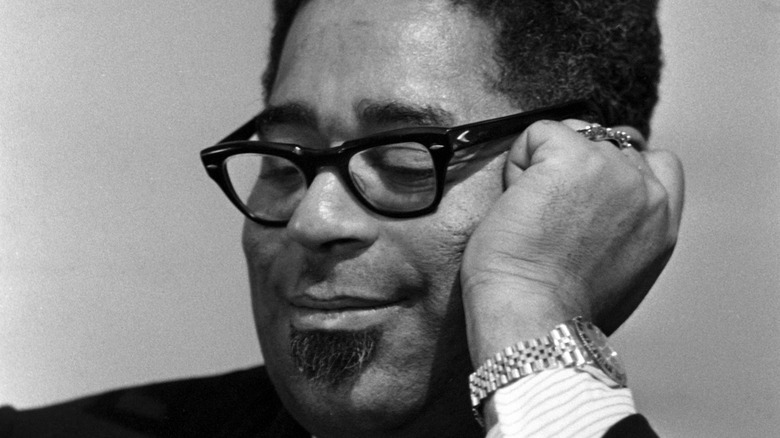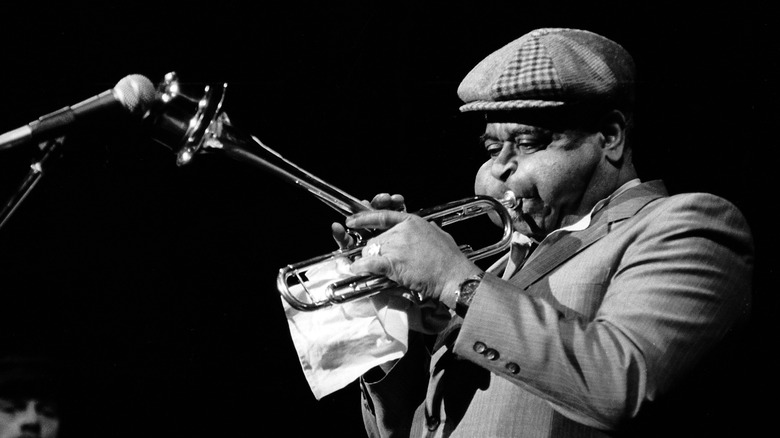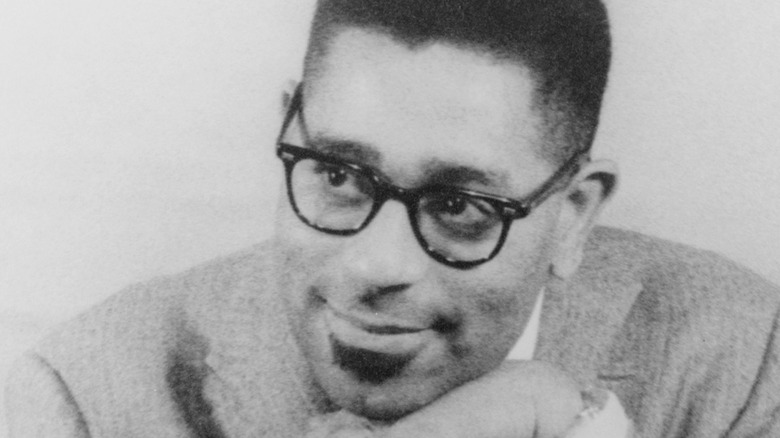How Did Dizzy Gillespie Get His Name?
Trumpeter John Birks Gillespie better known as Dizzy Gillespie was one of the most charismatic and influential musicians of the bebop jazz era. From his bullfrog-like cheeks which puffed up while he played to the uniquely-bent trumpet with which he made his music, Gillespie's style is unmistakable. Listen to a high-energy Gillespie solo from any point in his decades-long career and you will likely find yourself feeling dizzy with a rush of adrenaline (via Britannica). Is that effect, though, really what led some to start calling John Birks Gillespie "Dizzy?"
Gillespie was born in South Carolina in 1917 and died from cancer in 1993, according to The Washington Post. The story of how this acclaimed jazz musician got his nickname goes all the way back to the first ensemble the primarily self-taught musician ever played in, the Frankie Fairfax Band based in Philadelphia in the 1930s, as the University of Idaho Library website explains. As it turns out, the name Dizzy relates to an aspect of the jazz star's personality. And the reason the name stuck has to do with an act of kindness Gillespie extended to a fellow musician and friend with whom Gillespie played in that Fairfax group.
Dizzy Gillespie liked to make mischief
For almost as much as the music he made, Dizzy Gillespie has gone down in history as a mischief-maker in his personal life. After all, one would likely have a sense of humor to play like Gillespie played on an instrument bent by accident at a party (via The Washington Post). One such example of Gillespie's behavior came some five years after he picked up his first professional gig playing jazz with Frank Fairfax. By the year 1940, Gillespie had moved on to play in Cab Calloway's orchestra, a legendary jazz music ensemble in their own right.
At that point, it's said that someone threw a spitball during a rehearsal with Calloway, and Calloway — already frustrated with Gillespie's forward-looking nature and unwillingness to stick to the basics of big band and swing music — accused the young jazz musician of doing so. Gillespie denied he threw the spitball and in an ensuing physical confrontation stabbed Calloway in the leg with a pocket knife. As a result, Calloway fired him, as Jazzfuel explains. It was just this type of behavior that earned Gillespie his troublesome reputation, even when he was playing with Fairfax, according to Encyclopedia.
Gillespie was also a handful when he played in the Frank Fairfax band
While playing with Frank Fairfax in Philadelphia, Gillespie was known for similar zany and unpredictable antics, according to the National Endowment for the Arts website. Part of Gillespie's appeal was the plaid outfits he wore and the funny faces he made while on stage. He also told jokes, danced, and liked to tell stories while he performed his jazz music, according to The Washington Post. For this reason alone, a number of Gillespie's bandmates in the Frank Fairfield Band reportedly began to call John Birks "Dizzy" as early as 1935 because they thought that name suited his behavior.
It's said, though, that it took one very serious situation with a fellow Fairfield musician for the nickname "Dizzy" to become permanent. Along with Dizzy in the Frank Fairfax band was another trumpeter named Fats Palmer. While on tour with the group, Palmer nearly died, almost accidentally overcome by fumes by gasoline, but he was saved by Gillespie, according to the University of Idaho Library website. It's likely that other members of the Fairfax ensemble were calling John Birks "Dizzy" prior to that point, such as Bill Doggett, according to Encyclopedia. Once Gillespie saved Palmer, who also called him by Dizzy, though, that's what the jazz legend was known as from that point forward.


